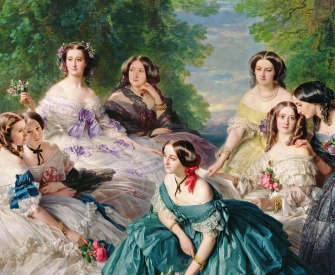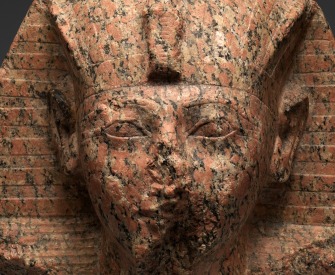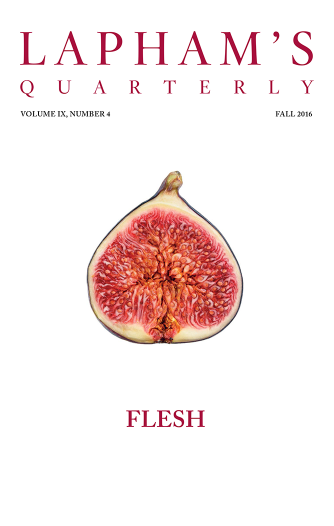After the evening prayer, the headmistress of the boarding school, Madame Beck, conducted me to an apartment where three children were asleep in three tiny beds. Serenely pointing to a fourth bed, Madame Beck intimated that it was to be mine; then, having extinguished the candle and substituted for it a night lamp, she glided through an inner door, which she left ajar—the entrance to her own chamber, a large, well-furnished apartment. Scarcely could I believe that not forty-eight hours had elapsed since I left London to teach here, under no other guardianship than that which protects the passenger-bird—with no prospect but the dubious cloud-tracery of hope.
I was a light sleeper; in the dead of night I suddenly awoke. All was hushed, but a white figure stood in the room—Madame in her nightdress. Moving without perceptible sound, she approached me: I feigned sleep, and she studied me long. I daresay she sat a quarter of an hour on the edge of my bed, gazing at my face. She then drew nearer, bent close over me, slightly raised my cap, and turned back the border so as to expose my hair; she looked at my hand lying on the bedclothes. This done, she turned to the chair where my clothes lay: it was at the foot of the bed. Hearing her touch and lift them, I opened my eyes with precaution, for I felt curious to see how far her taste for research would lead her. It led her a good way: every article did she inspect. I divined her motive for this proceeding, viz., the wish to form from the garments a judgment respecting the wearer, her station, means, neatness, etc. In my dress was a pocket; she fairly turned it inside out; she counted the money in my purse; she opened a little memorandum book, and coolly perused its contents. To a bunch of three keys, being those of my trunk, desk, and workbox, she accorded special attention: with these, indeed, she withdrew a moment to her own room. I softly rose in my bed and followed her with my eye: these keys, reader, were not brought back till they had left on the toilet of the adjoining room the impress of their wards in wax. All being thus done decently and in order, my property was returned to its place, my clothes were carefully refolded. Of what nature were the conclusions deduced from this scrutiny? Were they favorable or otherwise? Vain question. Madame’s face of stone betrayed no response.
The establishment was both a pensionnat and an externat: the day pupils exceeded one hundred in number; the boarders were about a score. Madame must have possessed high administrative powers: she ruled all these, together with four teachers, eight masters, six servants, and three children, managing at the same time to perfection the pupils’ parents and friends; and that without apparent effort; without bustle, fatigue, fever, or any symptom of undue excitement: occupied she always was—busy, rarely. It is true that Madame had her own system for managing and regulating this mass of machinery; and a very pretty system it was: the reader has seen a specimen of it, in that small affair of turning my pocket inside out, and reading my private memoranda. Surveillance, espionage—these were her watchwords.

The Cairo gang, a group of British intelligence operatives, Dublin, 1920. © Sean Sexton Collection / Bridgeman Images.
Often in the evening, after she had been plotting and counterplotting, spying and receiving the reports of spies all day, she would come up to my room. Very good sense she often showed; very sound opinions she often broached: she seemed to know that keeping girls in distrustful restraint, in blind ignorance, and under a surveillance that left them no moment and no corner for retirement, was not the best way to make them grow up honest and modest women; but she averred that ruinous consequences would ensue if any other method were tried with continental children: they were so accustomed to restraint that relaxation, however guarded, would be misunderstood and fatally presumed on. She was sick, she would declare, of the means she had to use, but use them she must; and after discoursing, often with dignity and delicacy to me, she would move away on her souliers de silence [shoes of silence], and glide ghostlike through the house, watching and spying everywhere, peering through every keyhole, listening behind every door.
As Madame Beck ruled by espionage, she of course had her staff of spies: she perfectly knew the quality of the tools she used, and while she would not scruple to handle the dirtiest for a dirty occasion—flinging this sort from her like refuse rind, after the orange has been duly squeezed—I have known her fastidious in seeking pure metal for clean uses; and when once a bloodless and rustless instrument was found, she was careful of the prize, keeping it in silk and cotton wool. Yet woe be to that man or woman who relied on her one inch beyond the point where it was her interest to be trustworthy: interest was the master key of Madame’s nature—the mainspring of her motives—the alpha and omega of her life.
That school offered her for her powers too limited a sphere; she ought to have swayed a nation: she should have been the leader of a turbulent legislative assembly. In her own single person, she could have comprised the duties of a first minister and a superintendent of police. Wise, firm, faithless; secret, crafty, passionless; watchful and inscrutable; acute and insensate—withal perfectly decorous—what more could be desired?
From Villette. Raised in a parsonage amid the moors of Haworth, Brontë based Villette, her final novel, on her experience teaching English at a pensionnat in Brussels in the 1840s. “A still more wonderful book than Jane Eyre, there is something almost preternatural in its power,” wrote George Eliot in a letter to a friend after the novel’s publication in 1853. “Villette, Villette—have you read it?” Brontë died two years later at the age of thirty-eight while at work on a novel called Emma.
Back to Issue





